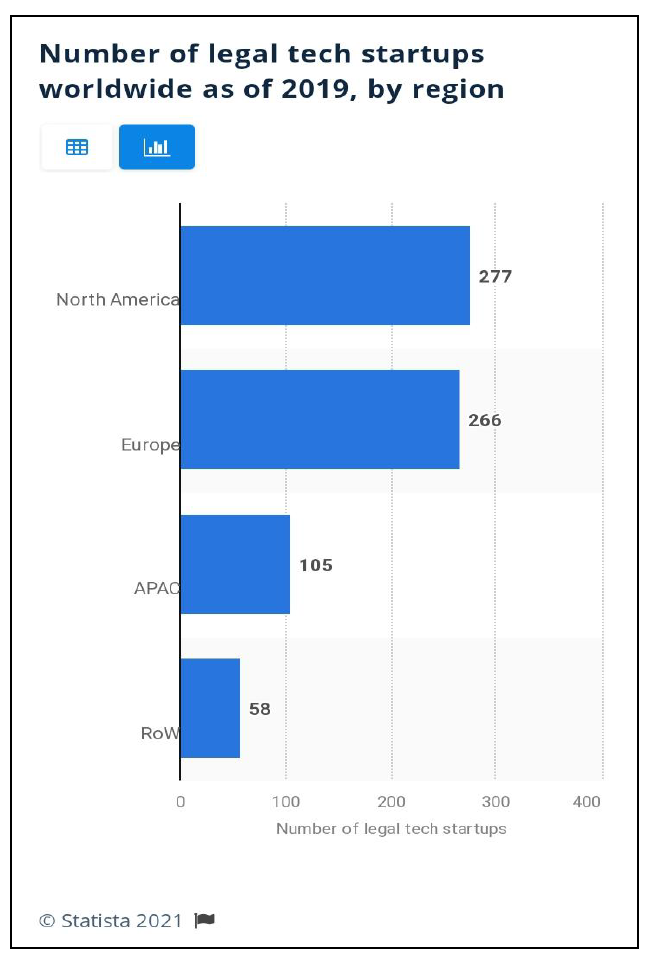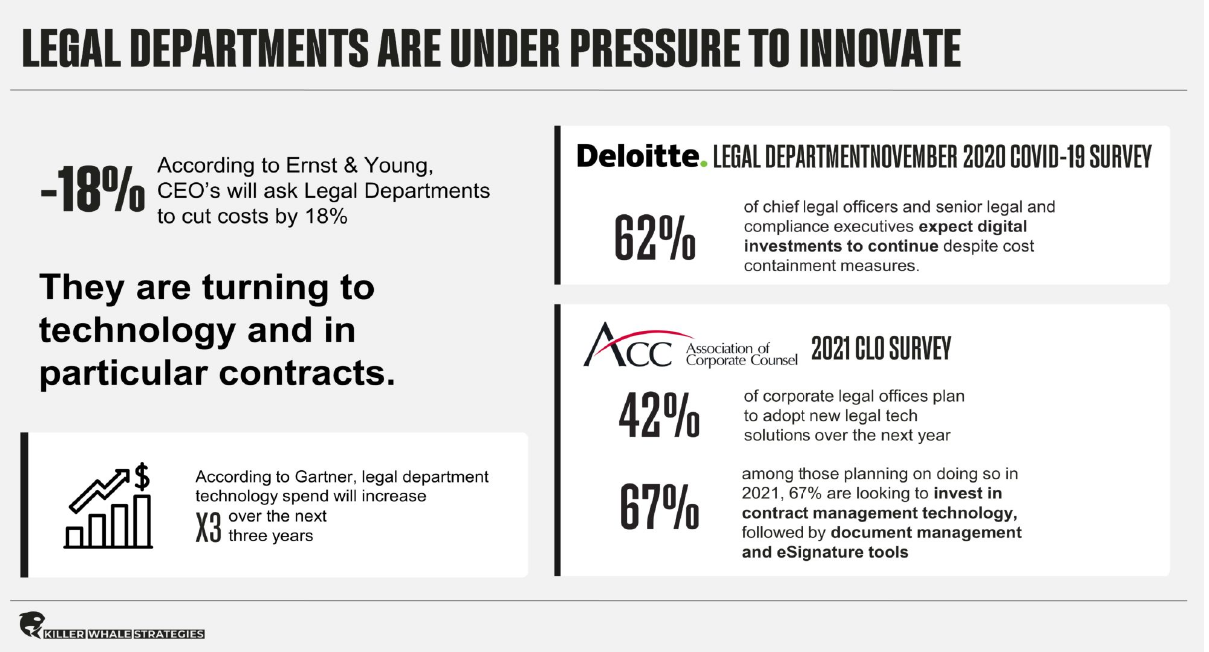Let’s see what 2022 looks like for legaltech!
The past decade has been monumental in the evolution of the human race because of the birth and rise of technology. Tech has integrated itself with almost all aspects of our lives and continues to underpin numerous industries. Law, or legal, is no different. We have witnessed a steady rise in the legaltech space. Of course, technology is not a new concept in Law. However, economic trends like rising inflation, the COVID-19 pandemic,
and jaw-dropping tech valuation multiples have led to a paradigm shift in the industry.
There are two reasons for this movement in legaltech: the rise in innovative solutions such as deep learning, AI, machine learning etc. and the second being the vast profit potential of the legal space for entrepreneurs. Legaltech companies are often startups founded to disrupt the traditionally conservative legal market.

In a study conducted by Statista, it was found that over 706 startups existed worldwide as of 2019 with 277 in North America, 266 in
Europe, 105 in the Asia Pacific region and 58 in the rest of the world. The numbers have grown exponentially since then.
2021 already saw 4 new unicorns – Silicon Valley-based Ironclad, iCertis, cloud-based practice management provider Clio and Israel-based transcription software Verbit.ai. According to data from Raymond James, there has been more money invested in legaltech in the first half of 2021 than there was in all of 2020.
Current trends in legaltech
With a large number of startups that exist, they come from different areas and fields. Below, you’ll find some of them:
● Online Dispute Resolution – ODR in India: A strong segment is the ODR or Online Dispute Resolution sector in this industry. It is a process to settle disputes outside of courts, and over the Internet, or through an online mode of communication/interaction between disputed parties. To simply put it, it means resolving disputes outside the court with the use of ADR methods such as negotiation, arbitration and mediation.
● e-Signature and e-Verification: Allows users to sign legal documents, file paperwork, attest scanned and digital
copies of legal documents, and verify documents in seconds.
● Compliance and risk management: Allows compliance managers to monitor regulatory changes, manage compliance documents, analyse past compliance records and conduct risk assessment.
● Legal research and analytics: AI based legal research tools and platforms that allow lawyers and others to sift
through large amounts of data
● Contract management: Manage, create, sign, negotiate and renew contracts digitally from a consolidated
contract management tool
● Legal matter management: Allows lawyers to define all their legal matters, condense documents, manage
contracts, send invoices and track case updates with a unified system.
● Lawyer practice management: To undertake functions like case management, timekeeping, billing, document
management, client relationship management, etc.
● e-discovery: Allows lawyers to collect and store critical ESI, perform targeted data collection,
build case strategy and much more.
● IP management
● Litigation finance
● Retail law
● Legal marketplaces
Across these segments, you’ll find that legaltech start-ups are growing faster than ever. Legal Evolution observed that “It took NetDocuments 20 years to reach the $1B “Unicorn” threshold, whereas it took Verbit only four”. This could be because companies are under pressure to innovate and digitize. Commercial clients, especially after the 2008 financial crisis, are demanding cheaper rates, faster processes and efficient services.
To keep up with this, companies need to automate their systems and legal departments are being asked to cut costs because of this. Some important findings are shown below:

While these remain to be segments in the industry, there are certain processes used across these segments such as cloud computing, artificial intelligence, speech recognition, predictive coding, contract building and review, chatbots, practice management automation and Case prediction. These are all a part of the current trends we see driving the demand and supply of the legal industry. From B2B, C2C and B2C operations to disseminating the transparency of acquiring legal help – the current legal space is more progressive than ever.
Current trends in ODR
Online Dispute Resolution or ODR, also known as Alternate Dispute Resolution (ADR) and Internet Dispute Resolution (iDR) – is a process to settle disputes outside of courts, and over the Internet, or through an online mode of communication/interaction between disputed parties. The framework utilizes mediation, arbitration, and negotiation (or a combination of all three) to resolve various types of disputes. The reason we look at ODR is because of its incredibly high revenue potential. According to Emergen Research, the global ODR market is expected to reach USD 210.53 million in 2028 (it was at USD 57.3 million in 2020) and register a revenue CAGR of 17.5%. Currently, the driving trends in the ODR sector are still in their conception but fast getting popular as
well.
Demand for Family ODR
Covid-19 has also accelerated demand for family ADR. We were already seeing a rise in mediation to settle family disputes, but when the pandemic restricted access to courthouses, the trend jumped into overdrive.
The urgency around settling delicate custody and support matters has pushed parties away from litigation toward ADR. We’re seeing a similar trend in other time-sensitive areas, such as personal injury cases, where there are issues around insurance coverage.
In general, people don’t want to wait for trials to resume. They are turning to mediation and arbitration to resolve disputes faster, more safely, and often at a lower cost. This will have a lasting effect on the industry as more people become aware of the benefits of ADR and get accustomed to the approach.
AI in ADR
Over the last few years, we’ve seen some interesting applications of artificial intelligence (AI) in the field of ADR.
We’re nowhere near the point where robots could replace mediators and arbitrators. However, AI is being used to facilitate and streamline certain stages of the process, such as:
● Explaining ground rules and parameters to clients and providing answers to frequently asked questions
● Collecting information from parties
● Quickly retrieving information from large volumes of documents
● Identifying behaviour patterns and potential dispute outcomes (using predictive analytics)
Whether AI is a friend or foe to ADR professionals is up for debate.
But there is no doubt that machine learning and automation will continue to shape the legaltech industry—just as they are impacting almost every aspect of human existence.
Future Potential Growth
An acceleration towards digital
According to research shown that a higher number of users are shifting to digitally accessible platforms which is why there will be a higher demand in the future for the legaltech department which is why the market potential for the legaltech department is increasing with every new user going digital
The automation of basic work
Lori Gonzales, CEO of Rayna corp. Says, “due to the possibility of digitally accessible platforms, legal professionals should be following the technology that transforms how basic administrative work can be automated. Any technology that changes the one-to-one model of lawyers to allow lawyers to serve a much larger market will be a game-changer.” This means that the market potential for the legaltech department is much more because there are already applications that help in removing the tiresome labour work of lawyers to go through every document for verification, thus providing extra time to serve a larger market.
Further improvements to document automation
Since a lot of lawyers/people have already moved on from wet ink signatures to digital signatures, it won’t be surprised when there comes a day where lawyers/people move on from wet ink documentation. Taking advantage of this upcoming inevitability will work to the benefit of the legaltech industry.
The prioritization of empathy that technology can help bring in
2020 has taught us the importance of human connections. In today’s day and age people want the feeling of being heard and want an instant response to their problems, unlike the days where to solve any legal problem people have to wait and keep on going in and out of the court until a new date is given for their cases but the problem isn’t solved and even if the problem is solved it takes so much time and effort, in today’s generation, people need to know that they’ve been heard and that the solution is on the way, this is where technology comes in. technology can make communication so much easier and have a much faster response time which is why legaltech will be a much better solution and have a greater market potential because due to legaltech people feel like they’ve been heard.
A more deliberate, thoughtful approach to remote work
Debbie Foster, a partner at affinity consulting has to say, “With 2020 in the rearview mirror, it will be important for legal professionals to embrace how technology can make the new distributed workforce model work more seamlessly. Many firms took a ‘just make it happen’ approach to collaboration, mobility, virtual meetings, and working remotely. The opportunity now is to revisit the tools firms are using, and the training the legal
professionals need to be able to leverage the technology, making the experience as good as—or better—than it was when everyone was in the office. The ROI for doing this right will be high, and will benefit the firm for years to come.”
By 2025, legal departments will increase their spending on legal technology threefold
The proportion of legal budgets spent on technology is set to increase drastically by 2025, according to a 2020 Gartner survey of legal leaders. This survey shows how the bar for money spent on the legaltech department has slowly increased and how it’s further going to shoot up, this proves that the demand for legal tech is slowly increasing and thus it has great potential to be the future of the legal industry.
By 2024, legal departments will replace 20% of generalist lawyers with non-lawyer staff
Efficiency is one of the biggest concerns for the legal department, and since the legaltech department is more focused on technology, there will be a certain % of employees that will be needed to handle the IT department and any other technology-related problems to provide further efficiency, thus a certain number of employees will be non-lawyer staff.
In Conclusion
It is strikingly clear that the adoption of technology in the legal space is not only inevitable but already here. While AI is still in its primary years we are able to integrate it in severe scales to maximise the potential of legal and tech together. Legaltech is the future of law. Mori Kabiri in a Forbes Council article succinctly said, “I anticipate that the surge in cloud-based software adoption will continue steadily through 2021. Lawyers, more than most, might be concerned about security in cloud computing, but as SaaS solutions get more robust, trust can be gained and adoption can increase.”
NOTE: this article is contributed by Mahima Kochar and Shrey Kothari.
About Mahima Kochar: I’m Mahima Kochar, a 19-year-old student at ISME, Mumbai where I am pursuing my diploma in Business and Liberal Arts and BA degree (University of Mumbai). I find my interests varied across Research, Sociology, Economics, Literature and recently have begun indulging in Finance and Tech as well. You can find me at mahimakochar@gmail.com! Find some of my written work on https://mahimakochar.wixsite.
About Shrey Kothari: My name is shrey Kothari I’m 19 years old and I’m currently pursuing my degree + diploma at ISME in Business management and Entrepreneurship. I have various divident interests in different fields such as, mixed martial arts, card magic, rubiks cube, football and reading books. As much as I love my extra curricular activities, I also love reading and learning more about things in this world.
You can find me at shreykkothari@gmail.com
Also read: here’s how a robot can help you with your NDA!
